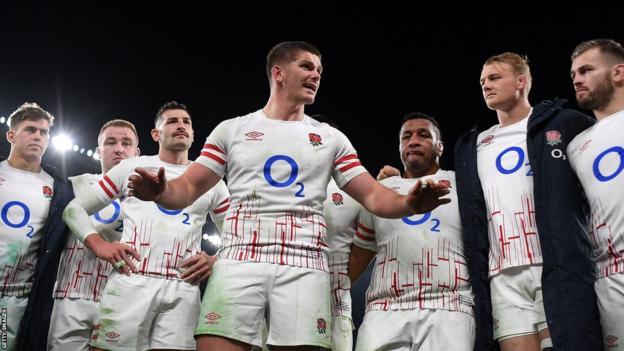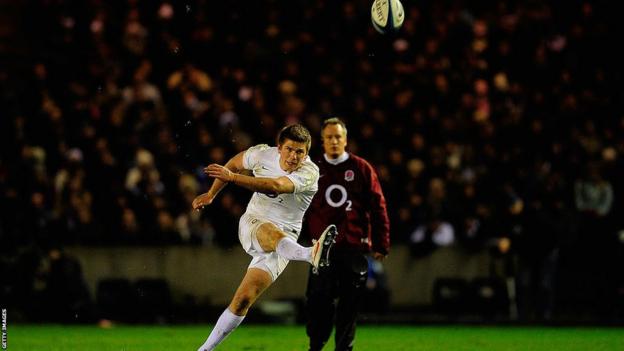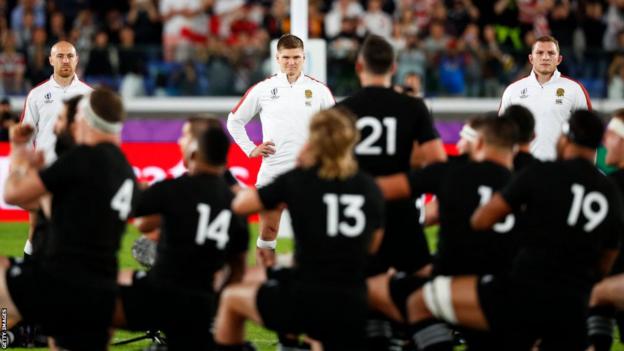[ad_1]

| Venue: Twickenham Stadium Date: Saturday, 19 November Kick-off: 17:30 GMT |
| Coverage: Live text commentary on the BBC Sport website and app, updates on BBC Radio 5 Live and BBC Sounds |
On Saturday evening, Owen Farrell – so forward-focused he might as well be in blinkers – may finally allow himself to reflect.
By then, Farrell’s century of England caps – a mark reached by only seven other players – will be complete.
Maybe his mind will wander back to his first a decade ago. Maybe it will go a little further.
Maybe it will linger on another day when, as a teenager, he was also awarded 100. It was his Physical Education A-Level.
Farrell had made his debut for Saracens the previous year, aged just 17 years and 11 days.
The exam board hadn’t been watching, though. Their moderators arrived at St George’s in Harpenden, wanting to see the student with a perfect score for his practical module.
They didn’t stay long. Farrell charged around a school field, fizzing passes off either hand, denting tackle pads and walloping kicks, to send them on their way with his mark unchanged.
Even now, though, when he is measured in Test caps rather than percentage points, some doubt Farrell.
For them, England’s current double playmaker pivot would be more potent as a single shot of creativity.
Fly-half Marcus Smith is ready to fly solo. Detach the training wheels. Insert a hard-running centre. Get Henry Slade offering an out-the-back option, stick some gas on either wing, light the match and stand back.
That’s the theory.
It doesn’t have any traction with Eddie Jones, though. And it certainly won’t put the skids under Farrell.
He has seen it all before. It has been a constant.
For all the silverware and golden moments he has contributed to English rugby, the 31-year-old has never quite seemed to capture hearts and minds as he might be expected.
“You’re not used to hearing people say nice things about you,” Farrell admitted this week.
There have always been alternatives and their advocates.
In the early part of his Test career, it was Freddie Burns. Later, it was a rejuvenated Danny Cipriani.
Both were maverick talents, who apparently needed Farrell to give way to shine. He steadfastly has not. If the England backline wasn’t big enough for both, Farrell was determined he wouldn’t be the one to sit out.
He has not just competed against his contemporaries either. There have been the ghosts of the past, too.

As he emerged as England’s 10, aged only 20, Farrell was eagerly compared to Jonny Wilkinson.
They shared the same prodigious talent, precision off the tee and physicality in the collision, but their contrasting characters meant that schtick never stuck.
Wilkinson was quiet, meditative and reflective; so weighed down by his own responsibilities, you feel captaincy would have ground him into the dirt.
By his own admission, Wilkinson spent the height of his career racked with anxiety at the significance of every kick or possible misstep.
Farrell relishes it. A high-decibel, high-definition leader, he’s the first off the bus and the last to speak in the huddle.
He demands a lot of his team-mates. Then gives them even more.
“It may only be after he is gone, but I think he will probably go down as one of the best players to ever play for England,” said Danny Care, who won the vast majority of his 87 caps alongside Farrell, on Rugby Union Daily.
“I don’t think he’s appreciated like he should be. I don’t think you realise how good he is until you have been in a dressing room or on a pitch with him. It will only be when he stops playing that he gets the respect he really, truly deserves.”
So, why the (relative) lack of love?
Some of it is rugby.
Farrell is the figurehead of a Saracens side who, in their period of dominance, had the respect of the rest of English rugby, but no love.
Also, at times, his will to win spills over into the ugly.
In a previous autumn, he flattened Izack Rodda and Andre Esterhuizen with hits that were barely legal. The one that knocked out Wasps teenager Charlie Atkinson a couple of years later certainly wasn’t and earned him a five-game ban.
Several referees have felt the rough edge of his tongue.
But some of it isn’t rugby.
Farrell’s persona – straight bat, straight face and flat vowels – sticks out in a sporting world of spin and schmooze.
He comes to Twickenham to win a match, not a popularity contest. When he retires, it is difficult to imagine him returning to work the corporate lounges or media gantry.
He is his own man and his team’s man. Everything outside is white noise. And those on the inside value him even more for it.
Jamie George first met Farrell at Hertfordshire Under-15 trials, and has been alongside him for county, club and country ever since.
“He was entirely different to anything I’ve ever seen before in terms of his skill level, desire and the way that he approached the game,” said George.
“It made me completely rethink everything. I used to think that I was skilful, but am I actually skilful? No. Do I apply myself in the right way? Well, I used to think I did, but clearly not. It was incredible.
“Owen has changed the way that English rugby has been played. We can genuinely say that.”

It’s a big claim, but the evidence is there. The legacy is spreading. You can trace it Twickenham’s home dressing room to Bugbrooke Badgers.
If you head down to the back pitches of that small Northamptonshire side on a weekend, you’ll find Tom Wood – a former England team-mate of Farrell – coaching the under-14s.
“I point to Owen regularly,” he said. “I tell my lad and his team-mates that that is the level of energy to bring.
“You can hear Owen celebrating every big hit, every turnover, every kick chase. He just lives and breathes it and it is infectious.
“A huge part of rugby is that energy you bring, that noise, and the level of detail and communication.
“It is not good enough to be in your own world doing your role. That is an individual sport mindset. You are part of a team. You need to talk.”
Farrell saves those words for who and when it matters.
Asked about his forthcoming landmark this week, he didn’t take the chance to wallow in history and his place in it.
“The most exciting bit is the game,” Farrell said.
Same as it ever is.


By Mike Henson
Source link




